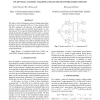Free Online Productivity Tools
i2Speak
i2Symbol
i2OCR
iTex2Img
iWeb2Print
iWeb2Shot
i2Type
iPdf2Split
iPdf2Merge
i2Bopomofo
i2Arabic
i2Style
i2Image
i2PDF
iLatex2Rtf
Sci2ools
112
Voted
ICASSP
2011
IEEE
2011
IEEE
On optimal channel training for uplink network MIMO systems
We study a multi-cell frequency-selective fading uplink channel from K user terminals (UTs) to B base stations (BSs). The BSs, assumed to be oblivious of the applied encoding scheme, compress and forward their observations to a central station (CS) via capacity limited backhaul links. The CS jointly decodes the messages from all UTs. Since we assume no prior channel state information, the channel needs to be estimated during its coherence time. Based on a lower bound of the ergodic mutual information, we determine the optimal fraction of the coherence time used for channel training. We then study how the optimal training length is impacted by the backhaul capacity. Our analysis is based on large random matrix theory but shown by simulations to be tight for even small system dimensions.
Capacity Limited Backhaul | Coherence Time | ICASSP 2011 | Prior Channel State | Signal Processing |
Related Content
| Added | 20 Aug 2011 |
| Updated | 20 Aug 2011 |
| Type | Journal |
| Year | 2011 |
| Where | ICASSP |
| Authors | Jakob Hoydis, Mari Kobayashi, Mérouane Debbah |
Comments (0)

